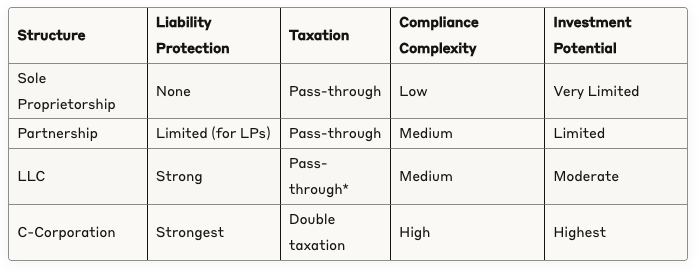Starting a cannabis business feels like navigating uncharted territory—and honestly, that's because it kind of is. The cannabis industry operates under a unique set of rules, regulations, and risks that don't exist in most other sectors. One of the most critical decisions you'll make early on is choosing the right legal structure for your business.
Think of your legal structure as the foundation of your house. Get it right from the start, and you'll have a solid base to build upon. Choose poorly, and you might find yourself dealing with costly renovations down the road—or worse, structural problems that could threaten your entire operation.

Don't worry though. While the cannabis industry might seem complex, the fundamentals of business structures haven't changed. We're here to break down the jargon, walk through your options, and help you make a confident decision that sets your cannabis business up for long-term success.
Why Your Cannabis Business Legal Structure Matters
Your legal structure isn't just paperwork—it's the framework that determines how your business operates, pays taxes, attracts investors, and protects you from liability. In the cannabis industry, these considerations become even more critical.
Here's what your legal structure affects:
Liability Protection: Cannabis businesses face unique risks, from regulatory violations to product liability issues. The right structure can shield your personal assets from business debts and legal claims.
Tax Implications: Thanks to Section 280E of the federal tax code, cannabis businesses can't deduct most business expenses. Your structure choice affects how you'll navigate these challenging tax waters.
Compliance Requirements: Cannabis regulators scrutinize everything from ownership structures to financial records. Some legal structures make compliance easier to manage and maintain.
Investment and Growth Potential: Planning to raise capital or expand? Investors often have preferences for certain business structures, and some make it easier to bring on partners or go public.
The cannabis industry adds layers of complexity to these standard business considerations. State regulations often dictate ownership requirements, residency restrictions, and reporting obligations that vary dramatically from traditional businesses. That's why having robust systems in place—like compliance management software—becomes essential for staying organized and audit-ready as you grow.

Common Legal Entity Types for Cannabis Businesses
Let's break down the most common legal structures you'll encounter, using plain English and cannabis-specific examples.
Sole Proprietorship
A sole proprietorship is the simplest business structure—essentially, you and your business are legally the same entity.
Pros:
- Ultimate simplicity in formation and operation
- Complete control over all business decisions
- Direct access to all profits
- Minimal paperwork and regulatory requirements
Cons:
- Zero liability protection (your personal assets are at risk)
- Limited credibility with investors, suppliers, and regulators
- Difficult to raise capital or bring on partners
- Not ideal for the high-risk cannabis environment
Cannabis Reality Check: Given the regulatory scrutiny and inherent risks in cannabis, sole proprietorships are rarely the best choice. Most cannabis businesses need the liability protection that comes with other structures.
Partnership (General & Limited)
Partnerships allow two or more people to share ownership and responsibility for a business.
General Partnership: All partners share equally in management, profits, and liability.
Limited Partnership: Includes general partners (who manage the business and assume liability) and limited partners (who invest capital but have restricted management roles and limited liability).
Pros:
- Pool resources and expertise with partners
- Relatively simple to form and operate
- Pass-through taxation (profits and losses flow to partners' personal tax returns)
- Flexible profit-sharing arrangements
Cons:
- Shared liability among general partners
- Potential for disputes over management decisions
- Difficulty raising outside capital
- Partners may face personal liability for business debts
Cannabis-Specific Considerations: Many states require detailed disclosure of all cannabis business owners, including background checks and residency requirements. This can complicate partnership structures and limit your choice of partners. Additionally, cannabis partnerships need robust tracking systems to maintain transparency with regulators—tools like Distru help ensure all partners have access to real-time compliance data and can easily generate reports for regulatory submissions.
.png)
Limited Liability Company (LLC)
LLCs combine the liability protection of corporations with the tax flexibility of partnerships—making them a popular choice for cannabis businesses.
Pros:
- Strong liability protection for owners (called "members")
- Pass-through taxation in most cases
- Operational flexibility without corporate formalities
- Easier to manage than corporations
- Can have different classes of membership with varying rights
Cons:
- State fees and reporting requirements vary widely
- Some states impose additional taxes on LLCs
- Limited life in some jurisdictions
- Can be more complex than partnerships
LLC vs Corporation for Cannabis: This is one of the biggest decisions many cannabis operators face. LLCs offer simplicity and tax advantages, while corporations provide better access to capital and more established structures for scaling.
Corporation (C-Corp & S-Corp)
Corporations are separate legal entities from their owners (shareholders), offering the strongest liability protection.
C-Corporation: The standard corporate structure with separate tax obligations.
S-Corporation: A tax election that allows pass-through taxation, but generally not available to cannabis companies due to federal law restrictions.
Pros:
- Maximum liability protection for shareholders
- Easier to raise capital and attract investors
- Established structure for scaling and going public
- Perpetual existence regardless of ownership changes
- Professional credibility with stakeholders
Cons:
- Double taxation (corporation pays taxes, then shareholders pay taxes on dividends)
- Ongoing corporate formalities and reporting requirements
- More complex and expensive to maintain
- Less operational flexibility than LLCs
Cannabis Industry Note: Most multi-state operators and large cannabis enterprises choose C-Corps because they provide the best structure for raising significant capital and scaling operations across multiple jurisdictions.
Key Considerations When Choosing a Cannabis Business Legal Structure
Now that you understand the options, let's dive into the factors that should drive your decision.
Tax Implications
Taxes in the cannabis industry are complicated, and your legal structure choice has major implications.
Section 280E Impact: This federal tax provision prevents cannabis businesses from deducting most business expenses, significantly increasing tax burdens. All cannabis businesses face 280E regardless of structure, but how it affects you varies.
Pass-Through vs. Corporate Taxation:
- Pass-through entities (LLCs, partnerships): Business income flows to owners' personal tax returns. Can be advantageous for managing 280E impacts.
- C-Corporations: Face double taxation but may have advantages for reinvesting profits and managing cash flow.
Quick Tip: Cannabis tax planning is complex enough that you'll want to work with an accountant who specializes in the industry. Don't try to navigate 280E alone.
Liability Protection
The cannabis industry carries inherent risks that make liability protection crucial:
- Regulatory violations and penalties
- Product liability claims
- Employment law issues
- Contract disputes with vendors and customers
- Property and casualty risks
How Different Structures Protect You:
- LLCs and Corporations: Provide strong liability protection, separating your personal assets from business obligations
- Partnerships: Offer limited protection for limited partners, but general partners remain exposed
- Sole Proprietorships: Provide no liability protection
Compliance Requirements
Cannabis businesses face intense regulatory scrutiny, and your legal structure affects compliance in several ways:
State Registration: Every cannabis business must register with state regulators, but requirements vary by entity type and jurisdiction.
Ownership Transparency: Most states require detailed disclosure of all owners, including background checks, financial disclosures, and residency requirements.
Ongoing Reporting: Cannabis businesses typically face more frequent and detailed reporting requirements than other industries.
Documentation Management: Maintaining organized records becomes critical for audits and renewals. This is where comprehensive cannabis management platforms like Distru shine—they automatically organize compliance documentation, track inventory movements, manage vendor relationships, and generate the detailed reports that regulators require, all while supporting whatever legal structure you choose.
Operational and Investment Needs
Consider your long-term goals when choosing a structure:
Scaling Potential: Planning to expand to multiple states? Corporations typically work better for multi-jurisdictional operations.
Investment Requirements: Need outside capital? Investors often prefer specific structures (usually C-Corps for larger investments).
Exit Strategy: Planning to sell eventually? Some structures make transitions easier than others.
Management Complexity: How many decision-makers do you want? LLCs offer more flexibility, while corporations have established management hierarchies.
How to Register Your Cannabis Business Legal Structure
Ready to make it official? Here's your step-by-step roadmap.
Step 1 – Research State and Local Laws
Every state—and often every municipality—has unique requirements for cannabis businesses. Before choosing your structure, research:
- Entity formation requirements
- Cannabis licensing prerequisites
- Ownership restrictions and residency requirements
- Local zoning and permit requirements
Quick Tip: State cannabis laws change frequently. What was true six months ago might not be accurate today. Always verify current requirements with official sources or qualified attorneys.
Step 2 – Choose Your Legal Structure
Based on everything we've covered, weigh these factors:
- Your liability protection needs
- Tax implications for your situation
- Growth and investment plans
- Compliance complexity you're comfortable managing
Strongly Recommended: Consult with an attorney who specializes in cannabis business formation. The cost of professional advice upfront can save you thousands in restructuring costs later.
Step 3 – File Formation Documents
Each structure requires specific paperwork:
LLC: Articles of Organization, Operating Agreement Corporation: Articles of Incorporation, Bylaws, initial board resolutions Partnership: Partnership Agreement
Document Organization Tip: Start building your compliance documentation system from day one. Organized records make everything from daily operations to regulatory audits much smoother. Consider implementing a comprehensive cannabis ERP system like Distru early in your business formation process—it integrates seamlessly with your chosen legal structure and grows with your business, handling everything from inventory tracking to financial reporting to regulatory compliance documentation.
Step 4 – Register for State Cannabis Licenses
Entity formation is just the beginning. You'll also need to:
- Submit cannabis license applications
- Complete background checks for all owners
- Provide detailed financial information
- Demonstrate compliance with local requirements
Preparation Tips:
- Gather all required documents before starting applications
- Budget extra time—cannabis licensing often takes longer than expected
- Consider working with consultants who specialize in cannabis licensing
Step 5 – Ongoing Compliance and Recordkeeping
Forming your entity is just the start. Ongoing compliance includes:
- Annual state filings and fees
- Regular cannabis regulatory reporting
- Maintaining corporate formalities (for corporations)
- Updating ownership documentation as needed
Compliance Strategy: Establish systems early for managing inventory, tracking sales, and maintaining records. This is where Distru becomes essential—it's purpose-built for cannabis businesses and handles the complex compliance requirements that come with any legal structure you choose. From seed-to-sale tracking to automated state reporting, Distru ensures your business stays compliant while you focus on growth.
Pros and Cons of Each Cannabis Business Legal Structure
Here's a quick reference comparison to help you evaluate your options:
At-a-Glance Comparison Table

*LLCs can elect corporate taxation in some situations
Example Scenarios
Solo Cultivator: Sarah grows craft cannabis in Oregon. An LLC provides liability protection while keeping operations simple and taxes manageable. The pass-through taxation helps with 280E planning. Sarah uses Distru to track her plants from seed to harvest, automatically generating compliance reports for the state while maintaining the detailed records her LLC structure requires for tax purposes.
Multi-State Operator (MSO): GreenTech processes cannabis products in five states. They chose a C-Corp structure to attract institutional investors and manage complex multi-state operations with consistent governance. As a Cannabis Multi-State Operator (MSO), they needed a comprehensive solution that could handle their vertical integration across multiple jurisdictions. Distru's cannabis ERP platform provides exactly what MSOs like GreenTech need: global reporting across all operations and states, consistent Standard Operating Procedures (SOPs) with built-in recipes and Bill of Materials functionality, seamless Metrc and Biotrack integration for compliance, and end-to-end inventory management across all locations. This comprehensive approach is essential for their corporate reporting obligations and investor transparency requirements.
Family-Run Retailer: The Martinez family operates two dispensaries in California. They initially considered a partnership but chose an LLC for better liability protection while maintaining family control and operational flexibility. Distru helps them manage inventory across both locations, track sales performance, and maintain the detailed financial records their LLC needs for tax reporting and member distributions.
Staying Compliant and Preparing for Growth
Your legal structure isn't set in stone—businesses often evolve their structures as they grow. A solo operator might start as an LLC and later convert to a C-Corp when seeking major investment.
Regular Compliance Checkups: Schedule annual reviews with your attorney and accountant to ensure your structure still fits your needs and you're meeting all requirements.
Technology Solutions: As your business grows, compliance becomes increasingly complex. Modern cannabis businesses rely on integrated software platforms to manage inventory tracking, regulatory reporting, financial management, and document organization—all from a single system. Distru stands out as the leading cannabis ERP Software, offering everything from cultivation tracking to retail point-of-sale, manufacturing management, and automated compliance reporting. Whether you're operating as an LLC, corporation, or partnership, Distru adapts to your business structure and scales with your operations.
For Multi-State Operations: If you're planning to expand across state lines, Distru offers specialized MSO capabilities that are essential for managing complex multi-jurisdictional operations. The platform provides unified global reporting across all states, standardized operations with consistent SOPs and BOMs, and seamless integration with state tracking systems like Metrc. This comprehensive approach is particularly valuable for corporations seeking to attract investors and maintain consistent governance across multiple markets.
The Distru Advantage for Cannabis Legal Structures:
- LLCs: Simplified reporting for member distributions and pass-through taxation
- Corporations: Comprehensive financial reporting for board meetings and investor updates
- Partnerships: Transparent tracking for all partners with role-based access controls
- Multi-State Operators (MSOs): Whether you're a vertical MSO controlling the entire supply chain, a multi-state brand partnering with license holders, or operating a hybrid model, Distru provides the enterprise-level capabilities you need. Key MSO features include global reporting and analytics across all operations and states, consistent SOPs with built-in recipes and Bill of Materials, seamless Metrc integration for compliance, best-in-class integrations with LeafLink, Trym, and top cannabis POS systems (BLAZE, Dutchie, Treez), plus a flexible Open API for custom enterprise integrations.
- All Structures: Automated compliance reporting, audit-ready documentation, and seamless integration with accounting systems
Growth Planning: Consider where you want to be in three to five years. The structure that works for a single-location startup might not work for a multi-state operation.
Quick Tip: Don't wait until you're drowning in compliance requirements to implement proper systems. Building good habits and using the right tools from the beginning saves time, reduces risk, and makes growth much smoother. Distru customers report saving 10-15 hours per week on compliance tasks, allowing them to focus on strategic growth rather than paperwork—regardless of their chosen legal structure.
Conclusion and Next Steps
Choosing the right legal framework for your cannabis business is one of the most important decisions you'll make as an entrepreneur. It affects everything from your daily operations to your long-term growth potential.
Remember these key points:
- Liability protection is crucial in the high-risk cannabis industry
- Tax implications are complex and require professional guidance
- Compliance requirements are ongoing and vary by state
- Your structure should support your growth goals, not limit them
The cannabis industry might be complex, but you don't have to navigate it alone. Professional advisors, industry organizations, and purpose-built software solutions like Distru can help you build a solid foundation for success. While your legal structure provides the framework, the right technology platform ensures you can operate efficiently and compliantly within that framework from day one.
Your Next Steps:
- Consult with a cannabis-experienced attorney and accountant
- Research specific requirements in your state and local jurisdiction
- Consider comprehensive cannabis management solutions like Distru early in your planning process
- Schedule a demo to see how the right software can support your chosen legal structure
- Connect with other cannabis entrepreneurs in your area
Ready to streamline your cannabis business operations? Regardless of which legal structure you choose, Distru provides the comprehensive tools you need to stay compliant, organized, and focused on growth. From seed-to-sale tracking to automated reporting, financial management to inventory optimization—Distru has everything cannabis businesses need in one integrated platform.
Schedule a Distru demo today to see how the right technology can support your business structure and set you up for long-term success.
Remember: There's no such thing as a stupid question when it comes to building your cannabis business. The industry is still evolving, and even experienced operators continue learning. We're all in this together, building a legitimate, compliant, and successful industry.
Additional Resources
Internal Resources:
- How to Get Into the Cannabis Business: A Complete Guide
- Cannabis Compliance: Key Driver in US Cannabis Industry
- Cannabis Business Plan Template and Guide
External Resources:
- Newburn Law: Cannabis Corporate Structures Guide
- Polston Tax: Cannabis Business Structure Considerations
- Your State's Cannabis Regulatory Agency Website
Professional Development:
- Local cannabis industry associations
- Cannabis business conferences and networking events
- Industry-specific legal and accounting professionals in your area
Ready to take the next step? Consider scheduling consultations with qualified professionals and exploring comprehensive cannabis management solutions like Distru that can grow with your business from startup to multi-state operations. The foundation you build today—both legal and technological—will determine your success tomorrow.
Learn more about Distru and how it supports cannabis businesses with every legal structure. Schedule a personalized demo to see how the right ERP platform can simplify compliance, streamline operations, and accelerate your growth—no matter which business structure you choose.










